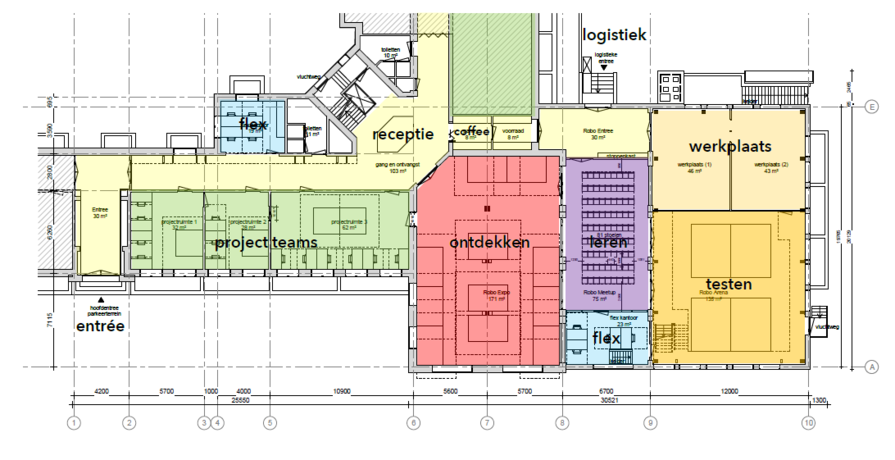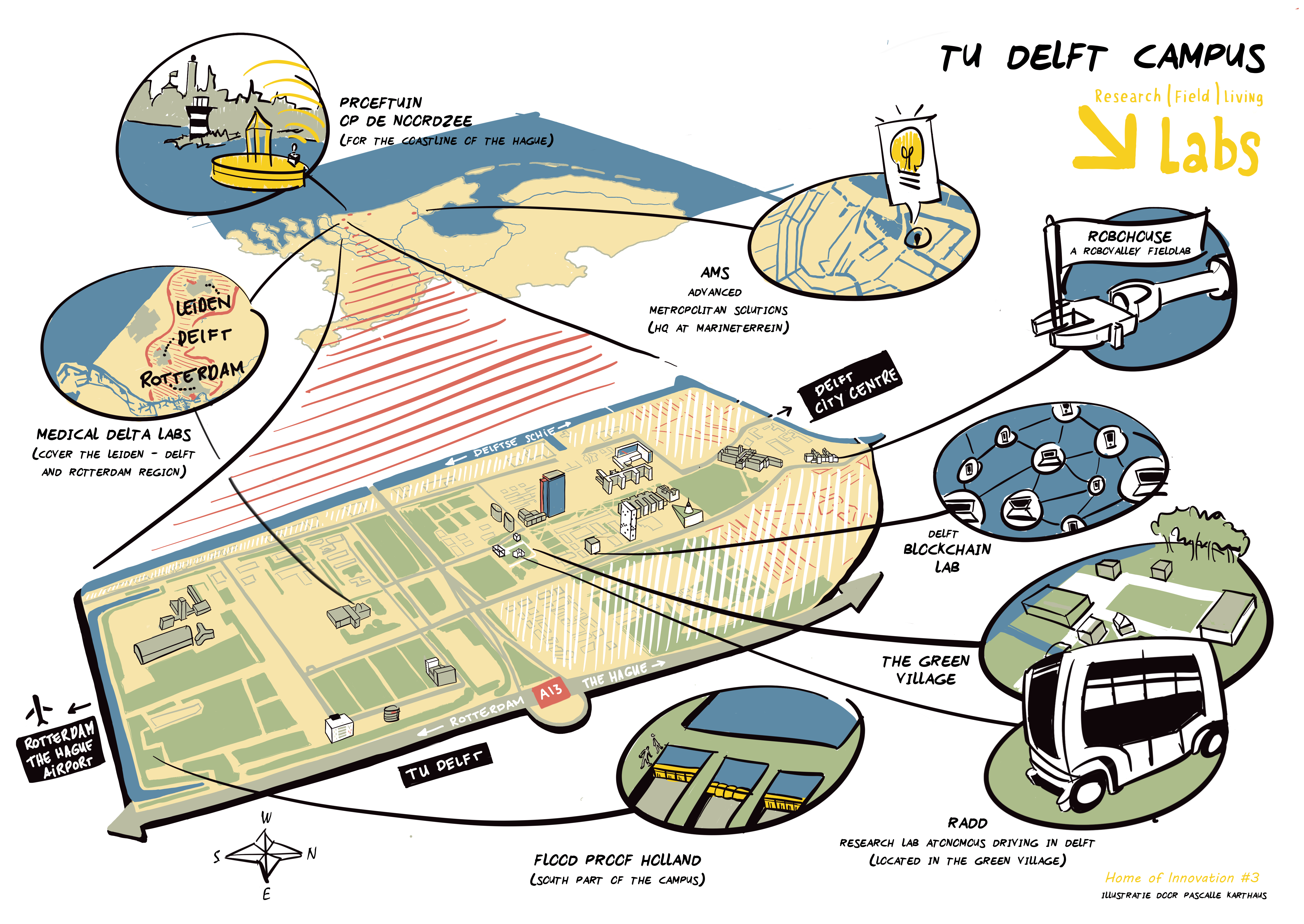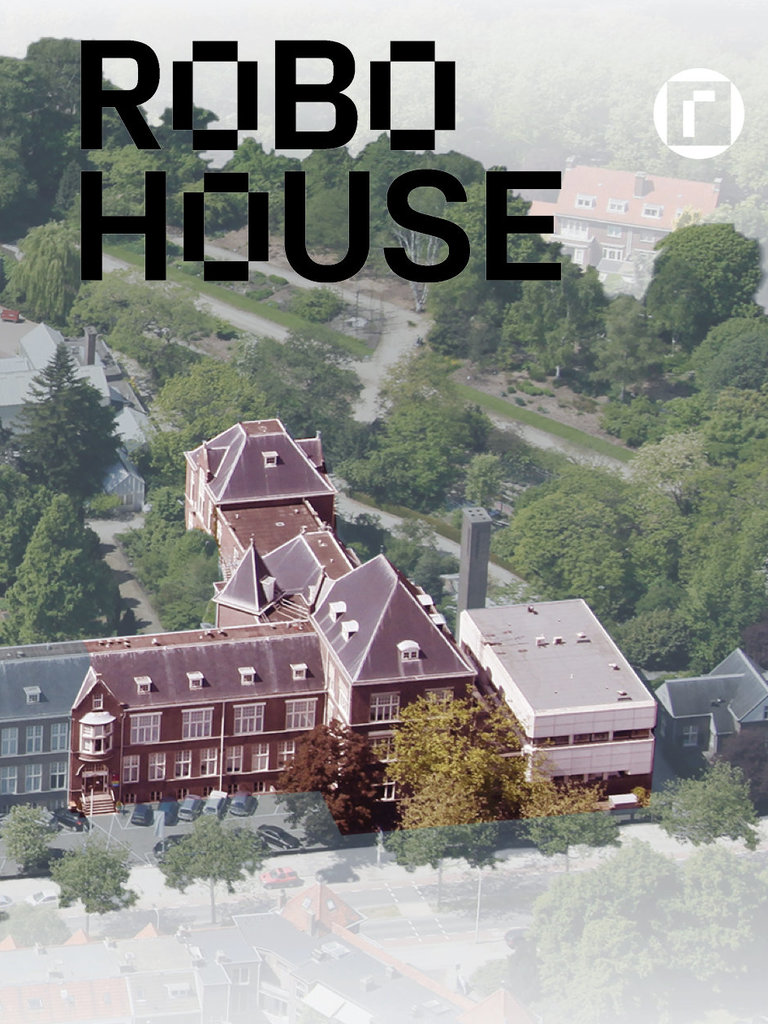
RoboHouse
Smart Industry Fieldlab for Advanced Cognitive Robotics Applications
Text: Jurjen Slump
RoboHouse is RoboValley’s fieldlab where manufacturing companies and innovative organisations can discover the possibilities cognitive robotics offer, develop their own applications and test them in an industrial setting.
The rapid developments in robotics will have a major impact on many sectors. A few organisations already make use of advanced robots, which apply artificial intelligence, are self-learning and can work autonomously. Machines that interact with their surroundings and can collaborate with people.
These cognitive robotics enable many new applications. Think of robots that can identify and process a variety of unknown objects and that can be deployed for order picking tasks in warehouses. Another example are inspection robots for remote and dangerous areas or production processes where humans and robots work together to solve complex tasks.
Most manufacturing companies are aware of the existence of these intelligent technologies and would like to gain practical experience with them. RoboHouse is the place where they can, in a practical way, learn to understand the potential – and limitations – of these robotics systems. A test facility to work on their own applications and a place to train their employees to collaborate with robots.
RoboHouse is an initiative of RoboValley, Festo, ABB, Exact, InnovationQuarter, TNO, The Hague University of Applied Sciences and Delft University of Technology. It will open its doors in 2018. Based on the campus of Delft University of Technology, RoboHouse offers direct access to the research of TU Delft Robotics Institute and hardware of industrial partners, such as ABB and Festo.
by Arjan van Timmeren, Scientific Director AMS
A view on RoboHouse
by Egbert-Jan Sol, TNO & Partner RoboHouse

Smart Industry Implementation Agenda
“All the field labs in the Netherlands - by now more than 30 in total - are part of a national Smart Industry programme. I work in the programme office, on behalf of TNO. In essence, field labs like RoboHouse bring about radical digital innovations in the industry and ensure that the workforce is trained to handle these innovations. ”
Skills training
“The basic principle of Smart Industry, or ‘Industrie 4.0’ as the Germans call it, is that the pace of digitisation in the industry is accelerating. How do you ensure that the working population is trained to deal effectively with more advanced robotics or blockchain technology? If we don’t get to grips with this right now, it may become a real social problem. The industrial environment of the field lab is actually the perfect place to train employees in these skills.”
SMITZH
“It’s important for the various field labs to collaborate efficiently, at both regional and national levels. In South Holland, we’ve set up the SMITZH programme (Smart Manufacturing: Industrial Application in South Holland) for this purpose. Entrepreneurs with questions about automation and digitisation can approach a SMITZH counter in the province. In addition, these regional smart industry hubs are also connected at the national level via a national expertise centre.”
RoboHouse
“At RoboHouse, TNO mainly provides expertise in the field of technology, for example, about sensors that help automate horticulture. At the same time, we are also involved in flexible manufacturing: making production processes more flexible with the use of robots. I think it would be a good idea to work on developing a fully autonomous greenhouse at RoboHouse. This means that in a few years we will no longer be an exporter of tomatoes and cucumbers only, but also of high-tech systems emerging from this same greenhouse!”
by Arjan van Timmeren, Scientific Director AMS
A view on RoboHouse
by Jan Koudijzer, Festo & partner RoboHouse
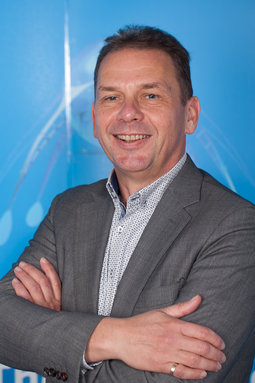
Collaboration
“We feel it’s important to work together with parties that are able to take automation to ever-higher levels. As a supplier of all kinds of motion components and control technology, Festo is a robot enabler. Rather than build ready-made robots, we deliver the components and composite functional modules. We want to demonstrate our competence and technology.”
Experience centre
“We’ve also set up our own experience centre at Festo: not just as a means to showcase our capabilities to our clients but also for our own employees, so that they can gain experience with the new solutions they devise. At RoboHouse, our primary aim is to demonstrate our experimental set-ups. On the other hand, we also want the RoboHouse demonstrators to be seen at Festo.”
Society
“As a Delft establishment, we feel responsible for our immediate environment. We’ve already been contributing to this for a while now, together with the municipality of Delft and TU Delft. It’s important to get young people excited about technology, which is what an initiative such as RoboHouse can do. In addition, we must continue developing our organisation further. Apart from the new generation, our current employees should also receive continuous training, preferably in a way that is enjoyable for them. The RoboHouse and other field labs also provide opportunities for doing this.”
Success
“We’ll consider RoboHouse a success once it starts doing well within a few years. With visitors following courses or working on projects in RoboHouse and where, hopefully, Festo technology will also be optimally showcased. It should not be a short-term project. RoboHouse must prove that it can exist independently in the long term: that the research is adequately funded, the developed technology is actually implemented at companies, and that it is able to become cost-efficient.
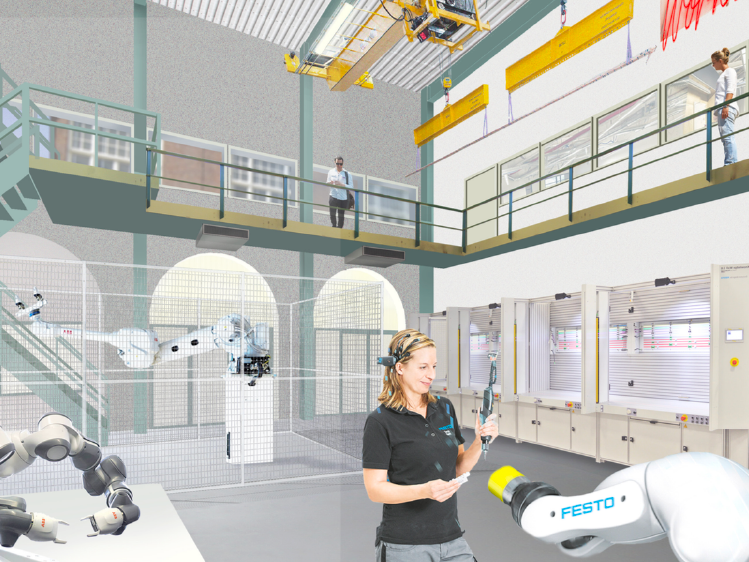
by Arjan van Timmeren, Scientific Director AMS
A view on RoboHouse
by Jaimy Siebel, manager RoboHouse

Mission
“It’s essential for the Netherlands to take advantage of the opportunities offered by new robotics technologies in a sustainable manner. RoboHouse is a veritable Mecca for advanced robotics in the Netherlands, enabling companies, knowledge institutions and other organisations to gain insight into the opportunities and limitations of robots in a practical manner. As a part of RoboValley, we have strong ties with start-ups and researchers in the field of robotics.”
Experience
“RoboHouse offers visitors a unique experience. The moment you come in, you will be confronted by the range of possibilities offered by intelligent systems. For example, a projection of red dots follows the visitor through the entrance and predicts where he or she is going. We try to incorporate as many interactive, playful elements as possible: for example, you can only ring the bell to enter if you smile.”
Network
“We collaborate closely with other regional field labs within the SMITZH programme. There are currently eight such labs, each with a different area of competence. Thanks to SMITZH, we now have a one-stop shop for companies that want to find out what ‘smart industry’ signifies for their own processes. At a national level, we also collaborate with other field labs involved with robotics, to ensure that learning and training opportunities in the field are properly aligned.”
For everyone
“Anyone can become a member of RoboHouse: students, employees of knowledge institutions, start-ups or individuals. For 199 Euros per month, you’re welcome to build and program your own robots at our facility. Non-members may also follow workshops and courses organised by us without any obligation. In this way, we make advanced technology accessible to everyone.”
